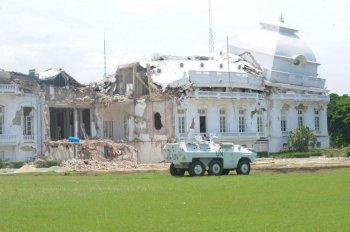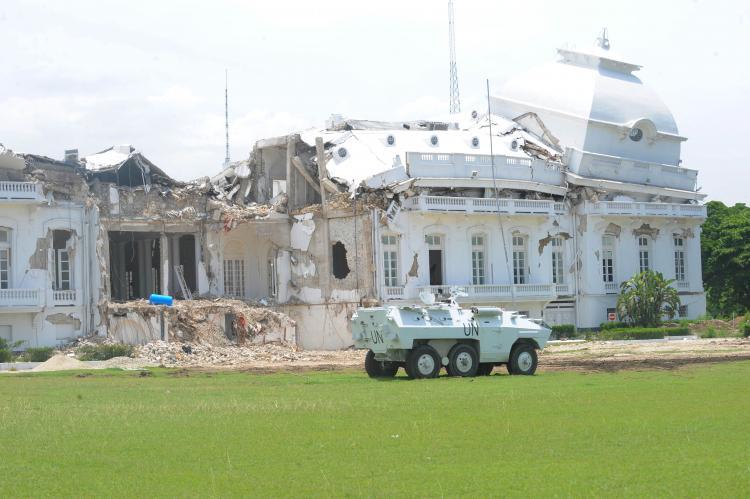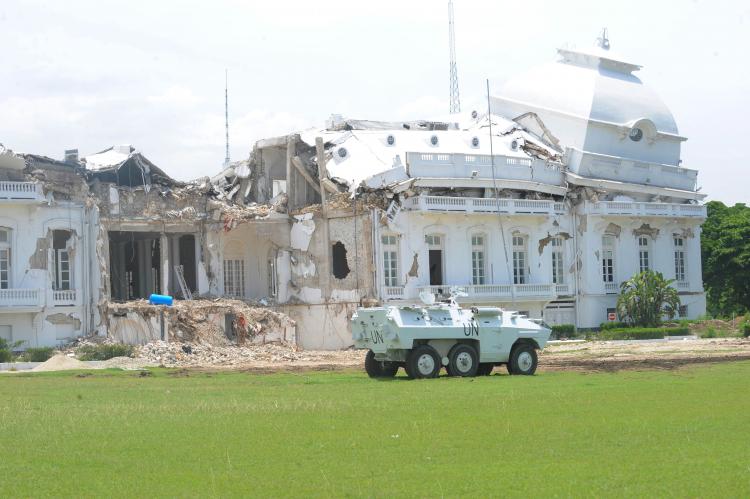A U.S. Senate committee report examining the effectiveness of $2 billion in U.S. aid to Haiti suggests that the rebuilding process in the country has stalled.
Five months after a devastating earthquake hit Haiti, killing 230,000 people and displacing millions, little has been achieved in terms of reconstructing the country, concludes the Haiti at Crossroads report published June 22.
“Rubble is still strewn all over the streets, the majority of buildings are damaged if not collapsed, and informal tent settlements—in penurious conditions—have sprouted everywhere,” says the report.
Emblematic of the stalled rebuilding process is the Presidential Palace, which to date remains in complete ruins without any signs of reconstruction.
“As the sense of immediate crisis has subsided, so has the sense of urgency to undertake bold action—the ‘‘reimagination’’ of Haiti hoped for months ago,” concludes the report.
Plans for moving millions of people out of the makeshift tent camps that mushroomed in the aftermath of the earthquake in Haiti’s capital Port-au-Prince, remain in an early draft form. With the hurricane season approaching,” even a modest hurricane could kill many thousands,” predicts the report.
The rainy season has already given rise to the spread of communicable diseases in the camps that lack proper medical care or security.
Even in the absence of the disastrous earthquake, the development of Haiti was an uphill battle.
Before the earthquake, less than 30 percent of Haitians had access to electricity, and half of those tapped into the power grid illegally. Eighty percent of Haitians lived on less than $2 a day.
Lack of Governance
Haiti’s leaders remain in “shock and mourning,” as large numbers of senior leaders, and civil servants died in the earthquake, according to the report.
“Almost all the ministry buildings were damaged or destroyed due to their proximity to the epicenter of the quake, immediately killing a huge number of civil servants and shattering the backbone of Haiti’s government,” describes the Senate committee.
At present, most ministries are operating out of makeshift offices, including tents, without working computers. Most civil servants have not received any salaries since the earthquake.
“The effort to rebuild Haiti must be led by Haiti’s government, starting with President Préval. To date, the government has not done an effective job of communicating to Haitians that it is in charge and ready to lead the rebuilding effort,” recommended the report’s authors.
Concerns exist over Haiti’s fragile democracy being further imperiled as parliamentary elections in November, originally scheduled for last February, face large challenges in registering voters since many government records were lost in the quake.
Donor Community
The report also ascribed some blame for the chaotic situation to the donor community, saying that disagreement and fragmentation have lead to conflicting messages on important matters being submitted to Haiti’s leadership.
“Current donor efforts are marked by excessive fragmentation and a proliferation of approaches and strategies that are undercutting recovery and rebuilding,” says the report.
The author’s of the report say that the donor community needs a unified and consistent voice to represent its interests and to align its priorities within an overall rebuilding framework.
Five months after a devastating earthquake hit Haiti, killing 230,000 people and displacing millions, little has been achieved in terms of reconstructing the country, concludes the Haiti at Crossroads report published June 22.
“Rubble is still strewn all over the streets, the majority of buildings are damaged if not collapsed, and informal tent settlements—in penurious conditions—have sprouted everywhere,” says the report.
Emblematic of the stalled rebuilding process is the Presidential Palace, which to date remains in complete ruins without any signs of reconstruction.
“As the sense of immediate crisis has subsided, so has the sense of urgency to undertake bold action—the ‘‘reimagination’’ of Haiti hoped for months ago,” concludes the report.
Plans for moving millions of people out of the makeshift tent camps that mushroomed in the aftermath of the earthquake in Haiti’s capital Port-au-Prince, remain in an early draft form. With the hurricane season approaching,” even a modest hurricane could kill many thousands,” predicts the report.
The rainy season has already given rise to the spread of communicable diseases in the camps that lack proper medical care or security.
Even in the absence of the disastrous earthquake, the development of Haiti was an uphill battle.
Before the earthquake, less than 30 percent of Haitians had access to electricity, and half of those tapped into the power grid illegally. Eighty percent of Haitians lived on less than $2 a day.
Lack of Governance
Haiti’s leaders remain in “shock and mourning,” as large numbers of senior leaders, and civil servants died in the earthquake, according to the report.
“Almost all the ministry buildings were damaged or destroyed due to their proximity to the epicenter of the quake, immediately killing a huge number of civil servants and shattering the backbone of Haiti’s government,” describes the Senate committee.
At present, most ministries are operating out of makeshift offices, including tents, without working computers. Most civil servants have not received any salaries since the earthquake.
“The effort to rebuild Haiti must be led by Haiti’s government, starting with President Préval. To date, the government has not done an effective job of communicating to Haitians that it is in charge and ready to lead the rebuilding effort,” recommended the report’s authors.
Concerns exist over Haiti’s fragile democracy being further imperiled as parliamentary elections in November, originally scheduled for last February, face large challenges in registering voters since many government records were lost in the quake.
Donor Community
The report also ascribed some blame for the chaotic situation to the donor community, saying that disagreement and fragmentation have lead to conflicting messages on important matters being submitted to Haiti’s leadership.
“Current donor efforts are marked by excessive fragmentation and a proliferation of approaches and strategies that are undercutting recovery and rebuilding,” says the report.
The author’s of the report say that the donor community needs a unified and consistent voice to represent its interests and to align its priorities within an overall rebuilding framework.






